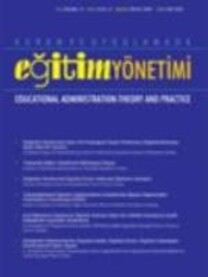Kız ve Erkek Öğretmen Adaylarının “Eğitim” Kavramına İliskin Metaforik Algıları
Bu arastırmanın amacı, öğretmen adaylarının “eğitim kavramı” hakkındaki düsüncelerini metaforlar aracılığıyla nasıl kavramsallastırdıklarını ortaya koymaktır. Arastırmanın çalısma grubunu, 2009-2010 eğitim öğretim döneminde bir vakıf üniversitesinde okuyan toplam 165 öğretmen adayı olusturmaktadır. Katılımcılar “Eğitim Bilimine Giris” dersine katılan birinci sınıf lisans öğrencileri ile yine aynı dersi alan tezsiz yüksek lisans öğrencileridir. Bu arastırma nitel arastırma yöntemlerinden biri olan olgubilim yaklasımı ile desenlenmistir. Arastırmaya katılan öğrenciler kolay ulasılabilir örneklem yöntemiyle seçilmistir. Katılımcıların görüsleri nitel bir arastırma yöntemi olan içerik yöntem ile analiz edilmistir. Katılımcıların görüsleri arastırmacılar tarafından gelistirilmis açık uçlu sorudan olusan bir görüsme formu ile toplanmıstır. Arastırmanın bulgularına göre; kız öğretmen adayı öğrencilerin somut metaforlardan su, fidan, bebek, çocuk ve yemek yeme olmak üzere bes kavramsal temayı kullandıkları; erkek öğretmen adayı öğrencilerin ise meyve ağacı kavramını kullandıkları görülmektedir. Öğrencilerin eğitime yönelik soyut metafor kavramlar bulmada sınırlı kaldıkları tespit edilmistir. Kız öğretmen adayı öğrencilerin eğitime iliskin kullandıkları metaforları seçme nedenleri eğitimin bireyi sekillendirmesi/ biçimlendirmesi, kaliteli yasam sunması, sürekli gelisim sağlaması, bireysel gelisimi desteklemesi, değisim yaratması, bir ürün ortaya çıkarması ve temel gereksinim olması olarak sıralanabilir. Erkek öğretmen adayı öğrencilerin eğitime iliskin kullandıkları metaforları seçme nedenleri ise eğitimin değisim yaratması, bir ürün olması ve varlığını sürdürmeyi sağlamasıdır.
Anahtar Kelimeler:
eğitim kavramı , öğretmen adayı , metafor , kız ve erkek öğrenciler
Metaphorical Perception on the Concept of “Education” of Prospective Girls and Men Teachers
The aim of this study is to reveal how prospective teachers conceptualize their opinions regarding “the concept of education” through metaphorical images. The sample consists of 165 prospective teachers studying at a founded university in 2009–2010 academic year. The participants of the study are freshman students and non-thesis master`s degree students who both take “Introduction to Educational Science” course. This study was designed with a phenomenology approach which is one of the qualitative research methods. The participants in the study were chosen with the method of availability sampling. Qualitative research design was used in data collection process. Open-ended questions were used as the method of data collection. Data analysis was done through content analysis. The results of the study reveal that while female prospective teachers use five conceptual themes of water, sapling, baby, child and eating among the concrete metaphors, male prospective teachers use the concept of fruit tree. It is found that prospective teachers have difficulty finding abstract metaphors related to education. The reason why female teacher candidates associate the metaphorical images of water, sapling, baby, child and eating with education is that they believe education shapes the individual; provides quality life; enables continuous development; supports personal development, leads to change; creates a new product and is an essential requirement for life. The reason for male teacher candidates' choosing the metaphorical image of fruit tree is that they believe education creates change; it produces a product and ensures survival.
Keywords:
education , prospective teacher , metaphor , female and male students,
___
- Alger, C. L. (2009). Secondary teachers’ conceptual metaphors of teaching and learning: Changes over the career span. Teaching and Teacher Education, 25(5), 743-751.
- Arslan, M. M., & Bayrakcı, M. (2006). Metaforik düşünme ve öğrenme yaklaşımının eğitim-öğretim açısından incelenmesi. Milli Eğitim Dergisi, 35 (171), 100-108.
- Botha, E. (2009). Why metaphor matters in education. South African Journal of Education , 29, 431-444.
- Bozlk, M. (2002). The college ctudent as learner: Insight gained through metaphor analysis. College Student Journal, 36, 142-151.
- Bayraktaroğlu, S., Kutanis, R. Ö., & Tunç, T. (2011). İnsan kaynakları yönetimi bilişsel düzeyde nasıl algılanıyor? Metafora dayalı bir değerlendirme. Eskişehir Osmangazi Üniversitesi İİBF Dergisi, 6(1), 7-29.
- Cameron, L. (2003). Advances in applied linguistics. Metaphor in educational discourse. (Edit. C. Chandlin and S. Sarangi). London: Continuum. Cerit, Y. (2008). Öğretmen kavramı ile ilgili metaforlara ilişkin öğrenci, öğretmen ve yöneticilerin görüşleri. Türk Eğitim Bilimleri Dergisi, 6(4), 693-7
- Cerit, Y. (2006). Öğrenci, öğretmen ve yöneticilerin okul kavramıyla ilgili metaforlara ilişkin görüşleri. Kuram ve Uygulamada Eğitim Bilimleri, 6(3), 669-6
- Çelikten, M. (2006). Kültür ve öğretmen metaforları. Erciyes Üniversitesi Sosyal Bilimler Enstitüsü Dergisi, 2 , 269-283.
- Deant-Read, C. H., & Szokolszky, A. (1993). Where do metaphors come from? Metaphor and Symbolic Activity, 8(3), 227-242.
- Dickmeyer, N. (1989). Metaphor, model and theory in education research. Teachers College Record, 91 (2), 151-160.
- Draaisma, D. (2007). Metaphors of memory: A history of ideas about the mind (Çev. G. Koca). İstanbul: Metis Press.
- Fang, X. (2007). Analysis on the metaphorical structure of education discourses. SINO-US English Teaching, 4(2), 52-55.
- Giroux, H. A., & Pena, A. N. (1979). Social education in the classroom: The dynamics of the hidden curriculum. Theory & Research in Social Education , 7(9), 21-42.
- ISSN: 1300-4832
- Yayın Aralığı: Yılda 4 Sayı
- Başlangıç: 1995
- Yayıncı: Pegem Akademi Yayıncılık Eğitim Danışmanlık Hizmetleri Tic. Ltd. Şti.
Sayıdaki Diğer Makaleler
TEMEL ÇALIK, ZEYNEP BUMİN SÜZEN
Kız ve Erkek Öğretmen Adaylarının “Eğitim” Kavramına İliskin Metaforik Algıları
Sadegül ALTUN AKBABA, Çiğdem APAYDIN
Lise Müdürlerinin Zorunlu Yer Değisikliği Uygulamasına İliskin Görüsleri
Salih Paşa MEMİŞOĞLU, Mete Sipahioğlu, Mustafa ÇELİK
İlköğretim Okullarında Görev Yapan Öğretmenlerin Algılarına Göre Okul Yönetiminde Kayırmacılık
